When grandparents enter the door, discipline flies out the window.
~Ogden Nash
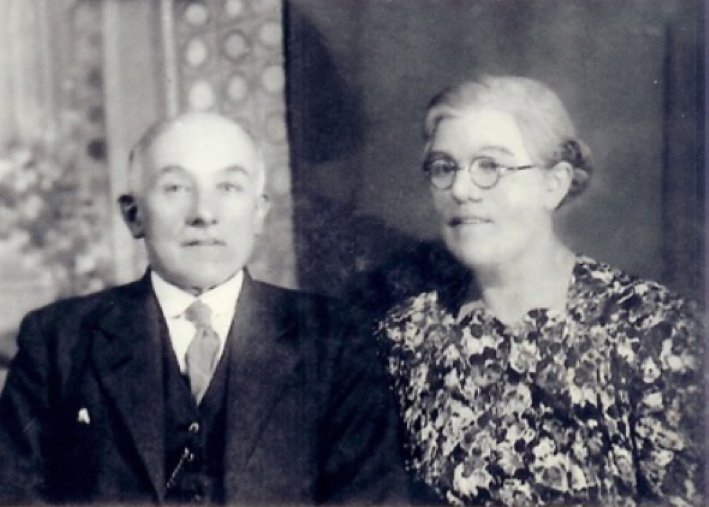 Grandpa Richard Charles Thomas and Grandma Naomi Forward Thomas
Grandpa Richard Charles Thomas and Grandma Naomi Forward Thomas
When I think of the Thomas’s (My Dad’s Family) I think “That’s Welsh” and laughter. I have no memories of my Thomas Grandparents, Uncle Harold, Aunt Gladys, Aunt Edith and Aunt Norma, all together, when they were with my dad that they were’t laughing. I don’t mean giggles I mean “pee your pants funny” – they could make each other laugh and laugh hard – it seemed to be a celebration of being together and survival. They all knew that life had its hard and fearful, but for the moment they could laugh and rejoice that they were together. They were happy people and that’s how I see them now that they have all gone ahead to the other side – together, together and laughing. Grandpa Thomas loved his kids and laughed with them. Grandma on the other hand seemed to be more reserved.
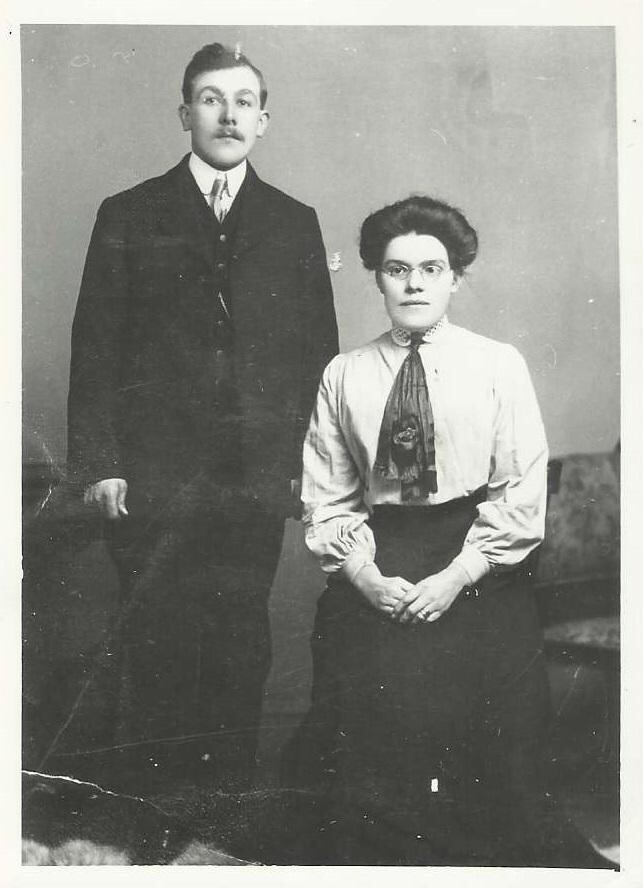 This Grandpa and Grandma Thomas on their Wedding Day. They look a little nervous.
This Grandpa and Grandma Thomas on their Wedding Day. They look a little nervous.
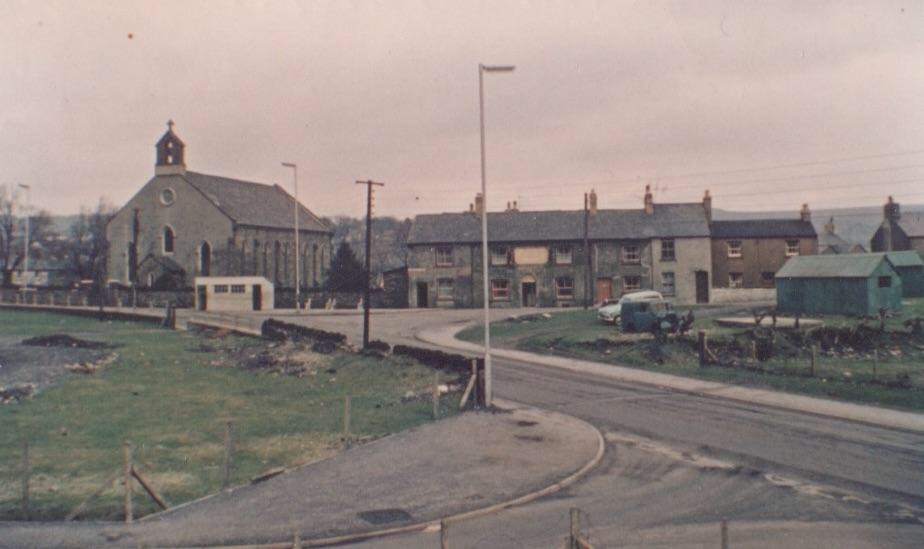 The Church to the left is where they got married.
The Church to the left is where they got married.
For some reason the Welsh, finally, got serious about surnames or last names in the fifteenth century. Prior to that names were patronymic or in reference to the father. These names were a genealogical record which indicated a son of with ab or ap and a daughter of with ferch. Such a name could record up to seven generations. Needless to say Grimly son of Gloin who is the son of…………. got to be a mouthful and group of introductions could take along time. Hence the change in the 1400’s. For some reason Thomas, spelt Tomas was very popular along with Jones, Morgan, Williams, Evans, Griffiths, Davies and Llewellyn. Some think Thomas was popular because of Saint Thomas Beckett, Henry II’s meddlesome priest, who was named after the doubting Apostle.
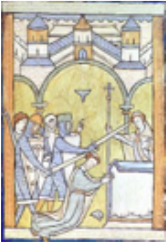
Thomas Becket’s Murder in Canterbury Cathedral A good movie called Beckett tells the story.
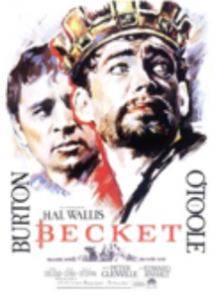 But even now Thomas is still in the top ten of Welsh last names. But, as noted, Welsh people were very comfortable with just a few last names and so you ended up with mobs of Jones’ and Williams’, etc. To distinguish each other they nicknamed all the males. William Williams became Billy Two Times. The young Jones boy that cried the first day in the mines was Billy Cry Baby. The David Griffiths who clean the waste out of the communal toilet was know as Dai Muck (Dai is the Welsh form for David). I wonder what Grandpa’s nickname was? I bet it had something to do with horses, maybe – Richard who loves the ponies.
But even now Thomas is still in the top ten of Welsh last names. But, as noted, Welsh people were very comfortable with just a few last names and so you ended up with mobs of Jones’ and Williams’, etc. To distinguish each other they nicknamed all the males. William Williams became Billy Two Times. The young Jones boy that cried the first day in the mines was Billy Cry Baby. The David Griffiths who clean the waste out of the communal toilet was know as Dai Muck (Dai is the Welsh form for David). I wonder what Grandpa’s nickname was? I bet it had something to do with horses, maybe – Richard who loves the ponies.
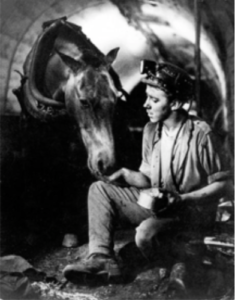
Girls were known by their first names until they married. Then she’d simply take the nickname of her husband with a Mrs. in front. She might be lucky enough to become Mrs. Dai Muck.
Grandpa Thomas was born in Sellack, Herefordshire, England, a parish, or village in Hereford, not Wales, but close on February 20, 1887. Just thirteen years out of the nineteenth century. He was born when horses were essential and saw them replaced by cars. I don’t think he ever had a driver license. I remember him walking everywhere or riding his bike.
He was raised on or at least worked on a farm. He knew how to earn his bread. At nine it was his job to keep the crows from stealing the newly planted wheat.
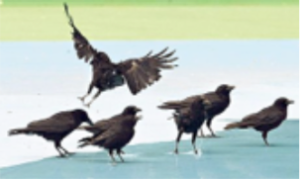
He had to chase them away or they would be hungry the next winter. He had some schooling, but at twelve (1899) he was on his own. He would make a living with horses. At first he was still working with and for bread, odd just like Grandpa Grundy? He helped the baker. He took the bread from door to door selling it. He also took care of the delivery wagon horses. He got on the wrong side of the baker when, without permission, he took some time off to “check the grass.” When he returned, and keep in mind he was thirteen or fourteen, he and the baker, as Grandpa put it “had a few words” and he walked off the job. He was somewhere between 13 or 15 and having words would be considered “cheeky.” He quickly found another job, inservice (working on an estate), for a retired Army Officer as a stable hand and handy man. He took care of two race horses and the carriage horses. He did a good job for two years and then his boss bought a car and sold the horses.
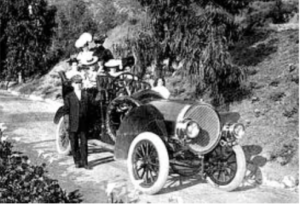
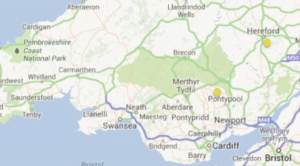 Hereford and Varteg South Wales
Hereford and Varteg South Wales
Now about 18 or 19 he answered an ad for a job in South Wales, just 16 miles on the other side of the River Wye, at a brewery (Beer Makers). With the excellent letter of recommendation from the Army Officer he got the job and moved to South Wales.
His job would be to groom the horses and and sell the product to the pubs (Bar or Saloon). Grandpa didn’t like how long he had to work and he wanted to shop for girls or maybe he had already found one. Because when he heard about a job for a pony wrangler in the coal mine that paid twice as much he applied, was hired and went under ground where in his free moments he could think about Welsh girls – a possible Mrs. Richard who loves horses.
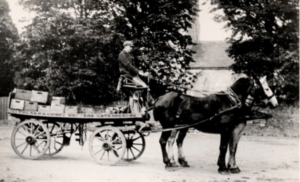 A Brewery Wagon and horses
A Brewery Wagon and horses
Grandpa Thomas was a late comer to the coal mines entering in his late teens or twenties(1905 or 1907). A young Welsh boy would enter the mine at thirteen, but the previous generation had sent them “down the pits” even younger and women too. Some young men had entered the mine when the were five or six years old and they would work from six in the morning until seven at night in the winter months they could go for months without seeing the sun, except on Sunday.
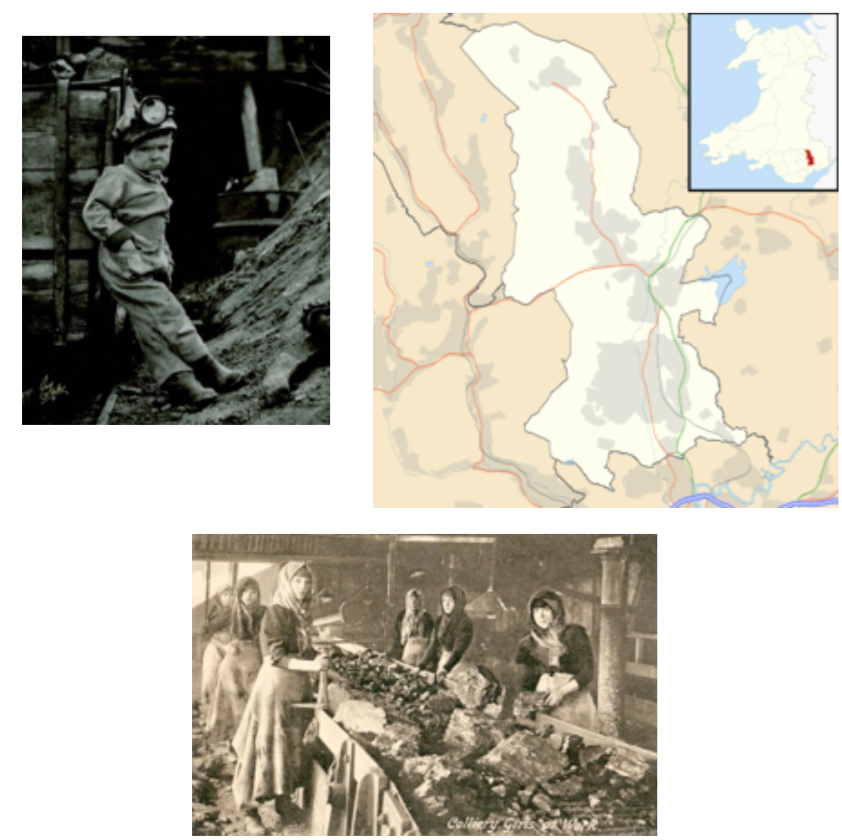 A young child miner, girls sorting the coal and South Wales
A young child miner, girls sorting the coal and South Wales
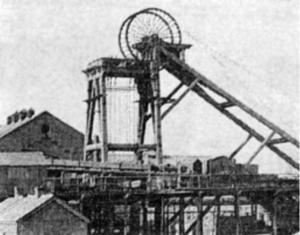 The Pit
The Pit
The pit had two openings. One to lower the men down, in an elevator, to where the coal was and the other provided an additional way down or up and a source for circulating fresh air in and the old hot and used air out. The best mines had fans to help ventilation of the air.
The greatest danger in the Welsh mines was methane gas which was both flammable and poisonous. To protect the miners, in the responsible mines, they would have access to breathing masks if gas was detected and specially designed lamps that kept the flame from igniting the gas and also indicated the presence of methane by the shape of the flame – if the flame became thin and tall methane was present. They had to be very careful.
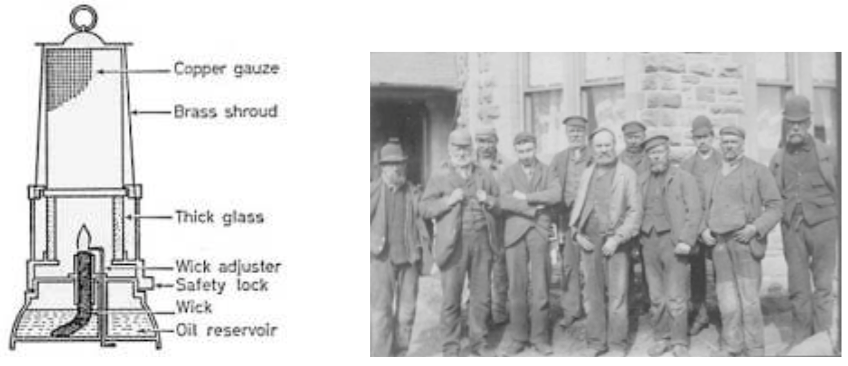
The gas if it was exposed to an open flame would ignite a flash of coal dust which would become a hot rolling cloud of fire racing throughout the shafts of the pit engulfing the miners. Another method to check for gas was canaries.
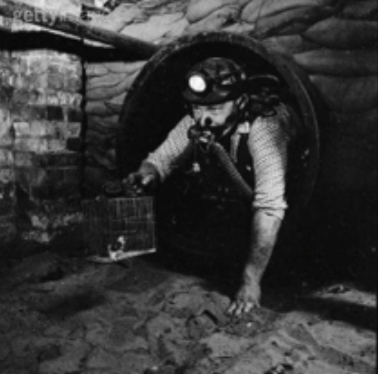
It was great for the miner, but the process would kill the Canary
The land that the mines were under were owned by wealthy land owners who leased the mineral or coal mining rights to mining companies. The quality of and safety in the mines was dependent on the morality of the mine owners and if it increased profits they might overlook safety lamps, breathing masks and ventilation fans. The behavior of immoral mine owners would feed an interest in socialism, communists and unions to fight for fair wage and safety for miners, but the Welsh ponies would be overlooked until Richard who loves horses came along.
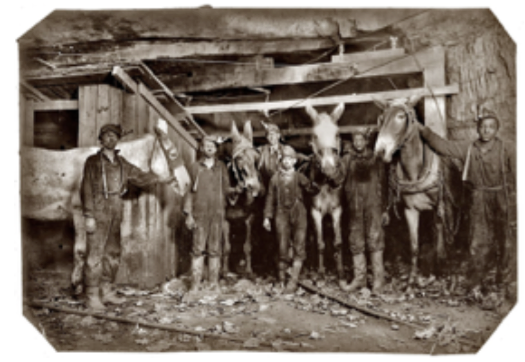 I was surprised at how large these ponies were
I was surprised at how large these ponies were
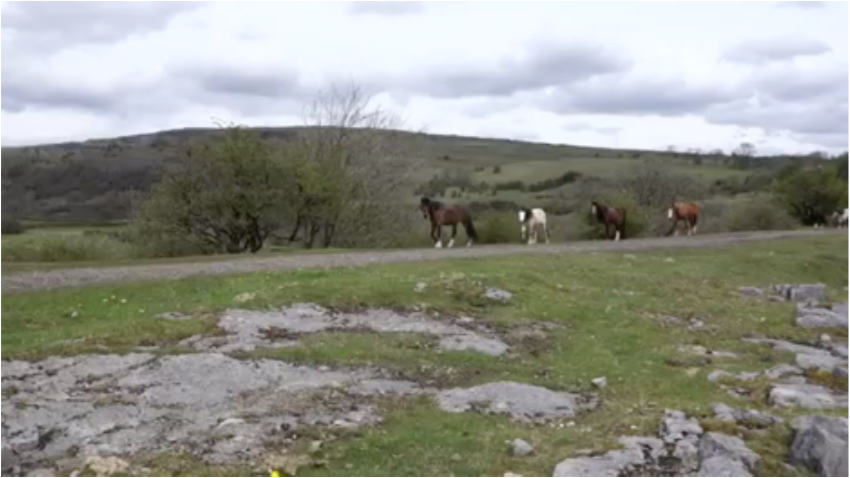
Wild Welsh Ponies today
To lock the miners in, as part of their salary or for rent was the house they lived in. If a miner quit or went out on strike he could be evicted from his home. If a miner was killed in a mine accident his wife and children could soon be on the street with their furniture.
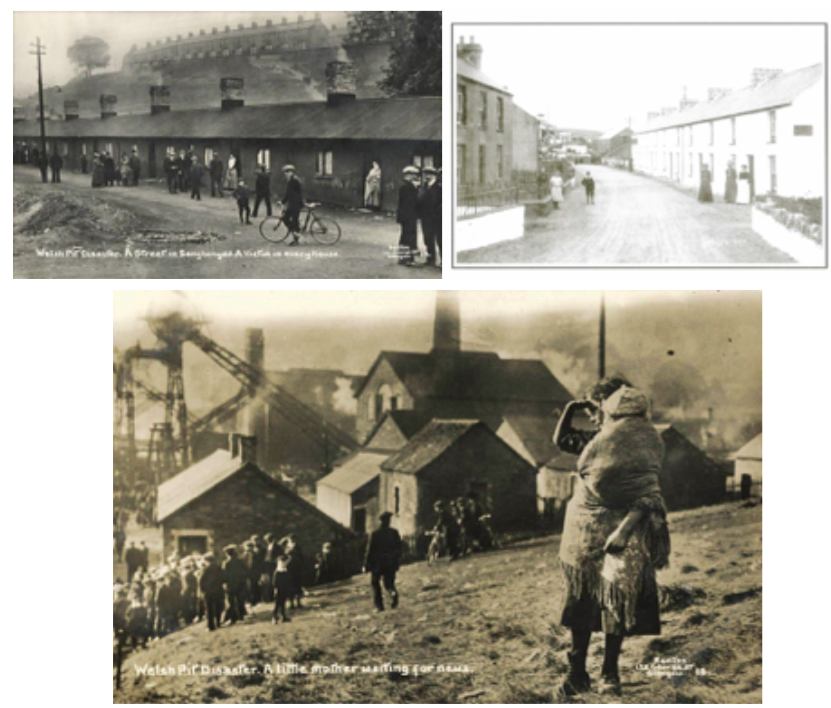 A Welsh Miner’s wife, on hearing there had been a mine accidents, waits to find out if she and her child have lost their provider and their home.
A Welsh Miner’s wife, on hearing there had been a mine accidents, waits to find out if she and her child have lost their provider and their home.
So entering “the pit” wasn’t anyone’s dream job, but it was where the money was and everyone else seemed to be working there. Grandpa would have had some trouble girl shopping when he worked from six in the morning to seven at night, Saturdays too in the mines. You would come out of the mine looking like this – 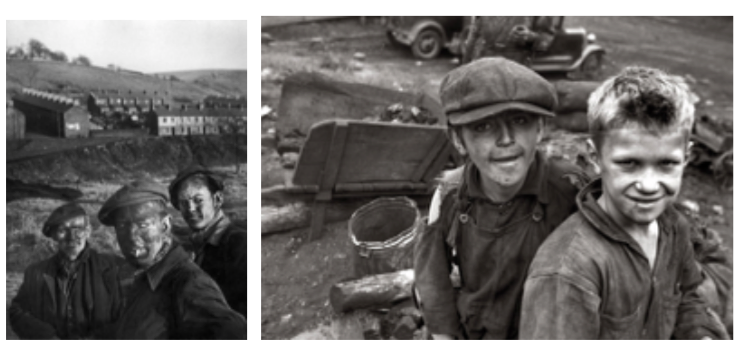 You couldn’t light up in the mine because of the gas
You couldn’t light up in the mine because of the gas
You didn’t bathe every night only on Saturday – in a great metal tub, oldest to youngest in the same water. The rest of the time you just had “a wash” – you’d wash the exposed places and maybe then “go out for a pint,” a drink at the local pub. But, I don’t see Grandma “Bar hopping” so I bet the best day for girl shopping was on Sunday because you had bathed the night before and the best place to see “good girls” would be Church.
In his one page biography Grandpa doesn’t tell us much, but implies there was a period of “girl shopping” and it appears he found her in Cwmavon.
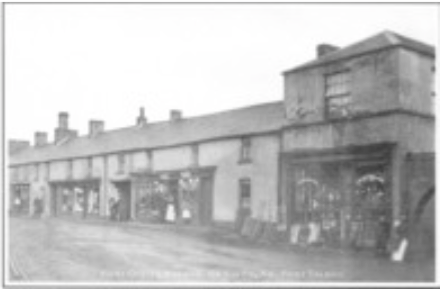 Cwmavon
Cwmavon
Her name was Naomi Forward. She was two months younger than him. They might have met in Church or maybe through the Welsh version of “Draggin” High Street. There must have been a respectful way of parading for each other, but I still lean towards Church. In South Wales you could choose between Church (Church of England) or Chapel (Methodist or Baptist), but this Forward girl threw in another option – she had people on her mother’s side that had been Mormons, they had even gone to America in 1867 to mine coal, but Grandma wasn’t a Mormon (Yet).
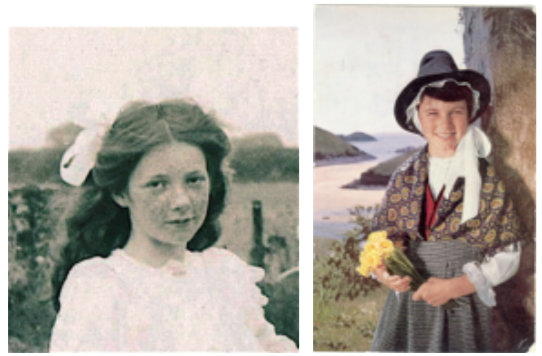 This isn’t Grandma, just a pretty English girl from the right time period. The girl on the right is wearing the traditional outfit of a Welsh girl. I doubt that Grandma was wearing this when they met.
This isn’t Grandma, just a pretty English girl from the right time period. The girl on the right is wearing the traditional outfit of a Welsh girl. I doubt that Grandma was wearing this when they met.
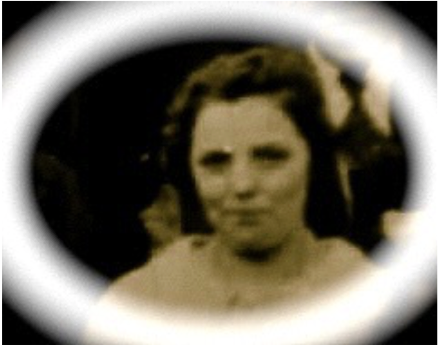 This is earliest picture of Grandma I could find – maybe 1920 Ten Years and several babies later
This is earliest picture of Grandma I could find – maybe 1920 Ten Years and several babies later
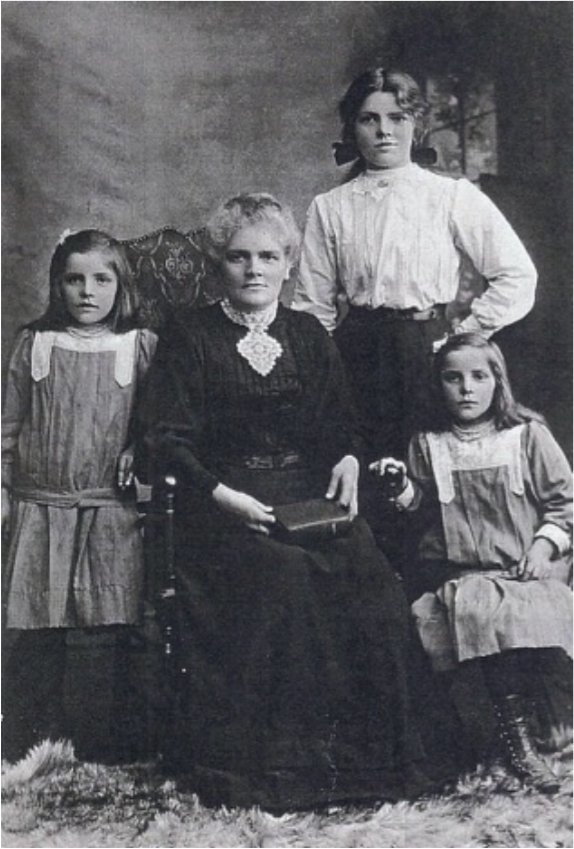 Grandma Forward and Grandma Thomas’s younger Sisters
Grandma Forward and Grandma Thomas’s younger Sisters
Grandma was one part Biggs and the other part Forward. She was the third child of eleven kids, but she was the first girl and such became caretaker for all the younger ones. Only one of the eleven died, a boy at three, the rest grew to adulthood.
Grandma spoke of the pleasure she got from going to the Wesleylen Church’s Sunday School(Chapel, Methodists, not Church), she loved her Sunday School teacher who would take the children home with her to have “good clean fun”. But her youth was spent working and she regretted that she had never learned to dance.
Grandma Naomi was given an English education, which meant she was groomed for servitude – to cook, sew, clean and “wait on table” for the English. On graduation, at thirteen, she got a servant’s job in Cardiff, working for a minister. Their name was Thomas, but Grandma didn’t like the servant clothes, as she described it “dolled up in caps and aprons.” She was paid 20 shillings a month (A British Pound). Grandma was thrilled with the sophistication of Cardiff – Fancy clothes, the church bells and Cardiff was closer to the ocean, but she yearn for home and soon came back to find the family had moved from Cwmavon to Varteg to Mormon Row or the “Five Houses.”
 Varteg Hill today
Varteg Hill today
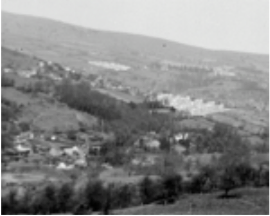 A Picture of the Welsh Hills Then
A Picture of the Welsh Hills Then
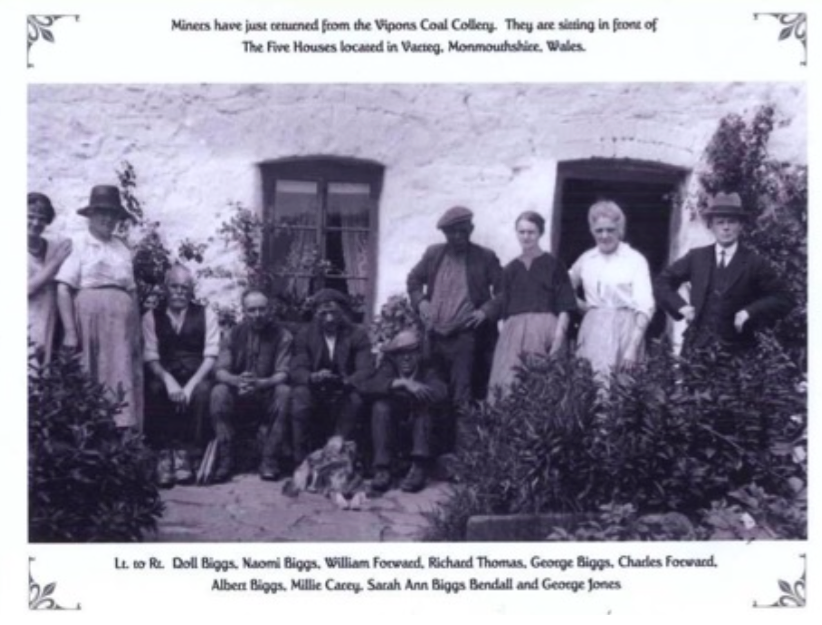
Grandpa Thomas is 4th from the left.
(A Side Bar, or digression here) I think the appeal of going to Zion (Utah) would be obvious for a Welsh coal miner. Coal mining was just a new spin on “share cropping” where everything was stacked in favor of the owners – “I owe my soul to the company store.” What the Mormons were offering was a new start in America and Heavenly Father wanted you to do it. The trigger was a man named Dan W. Jones.
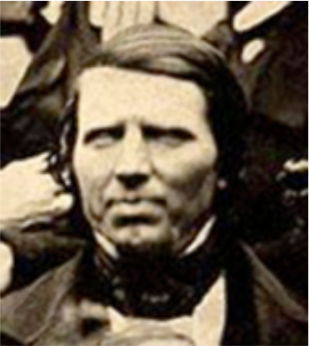 This Dan Jones the Welsh Mormon Missionary
This Dan Jones the Welsh Mormon Missionary
Dan Jones (Daniel Webster Jones) had been born in Halkyn in North East Wales. When he was sixteen he became a sailor. He married his childhood sweetheart Jane Melling and 1840 they moved to America where he became a river boat captain on the Mississippi River. He soon heard of the Mormons and their city Nauvoo. He sought the Mormons out and like what he heard and was baptized in January of 1843. In June of 1844 Joseph Smith and his brother Hyrum were arrested and placed in jail in Carthage, Illinois. Dan Jones went along to support and protect the brothers. The night before the Smith brothers were killed by a ruthless mob, Joseph Smith asked Jones if he was afraid to die. Jones replied, “Has that time come, think you? Engaged in such a cause, I do not think that death would not have many terrors.” Smith replied with what many have identified as his “last prophecy”: “You will yet see Wales and fulfill the mission appointed you before you die.” Jones was given a letter to take to the Smith’s attorney and while he was away on June 27, 1844 Joseph and Hyrum were killed.
Dan Jones was sent to Britain in late 1844 by Brigham Young. Within a year Jones was presiding over 200 Saint in Wales. Jones spoke and could write in Welsh and his effort continued to grow – between 1845 to 1848 the Welsh Church grew to 3600 Saints
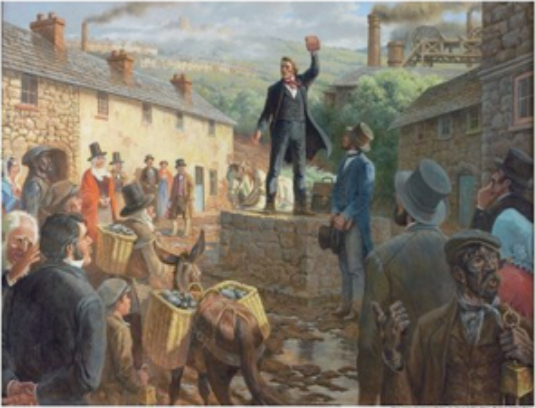 Dan Jones Sharing the Message in South Wales. Many thousands of Welsh converts immigrated to America, heading West with Brigham Young as a part of the great Mormon Migration, which began in 1847. Today it is estimated that approximately twenty percent of the population of Utah is of Welsh descent.
Dan Jones Sharing the Message in South Wales. Many thousands of Welsh converts immigrated to America, heading West with Brigham Young as a part of the great Mormon Migration, which began in 1847. Today it is estimated that approximately twenty percent of the population of Utah is of Welsh descent.
As the message of the restoration spread throughout Wales, many saints eagerly asked, “Pa bryd y cawn fyned i Seion?”, which means “When may we go to Zion?” The new converts sought to follow the counsel of their leaders to leave “Babylon” (Wales) and go to “Zion” (Utah). A large number of the early Welsh converts were swept up on the road to Zion, but most of my Grandma and Grandpa Thomas’s people didn’t join the Church until 1910.
For some reason 1910 was a good year for the Church – My Great Grandpa Forward, Grandma’s Dad, had at best lukewarm feelings when he heard about the Mormons and he smoked, a Mormon No No. I think when “Zion Fever” hit my great Grandmother Forward, who had been born 1865 and married in 1883 and had missed the first push to Zion. Her parents would have been children too in the 1840 and 50‘s. So Naomi Forward was a pretty girl with possible Mormon “leanings” who caught the eye and heart of my Grandpa Richard who loves horses Thomas. They married on August 9, 1909.
They set up house in the Five Houses in Varteg and would have seven children, but two boys, Cyril (February to April of 1910) and Ivin Raymond (June 3, 1919 to May 4, 1920) would die of pneumonia. Living with your parents, at least for awhile, is a long standing Thomas tradition. But all of the children were listed as being born in Varteg (Five Houses?) Grandpa learned that one of Grandma Thomas’s uncles was a Mormon. Grandpa was invited to meetings in a members homes and an Elder George F. Price impressed both Grandma and Grandpa with the truth of the gospel and the patriarchal side of the Thomas clan joined the Church on July 18, 1910. Grandpa noted that every other Sunday they walked six miles to their Church meetings and the other Sunday they walked twelve miles, but Grandpa said it was all thrilling. Grandpa said he was made the Branch Clerk in 1911 and they found a hall to rent. I hope that reduced their walking time. When I was in Pontypool in 1963-4 it would have been a real hike from Five Houses to the Mormon Branch Chapel. In 1915 the year before my Dad was born he became the Branch President. It is interesting to note that with exception of Cyril all of their children were born in the Church.
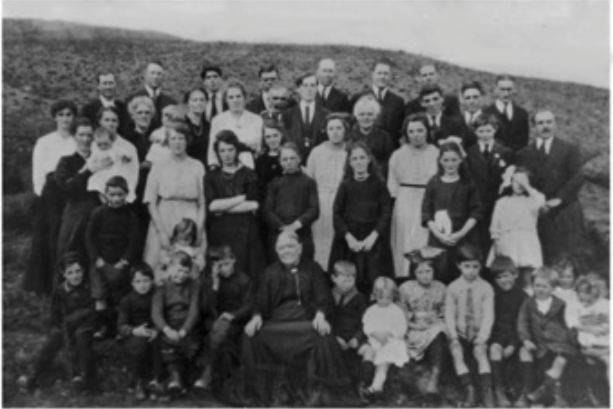 Pontypool Branch with Grandpa with the mustache at the middle far right, Grandma three over to the left and the kids bottom right (My guess – Harold is on the front row left, Gladys might be the girl with the ribbon three to the left of my Dad second from the end, your Grandpa, in knee pants looking right at the camera on the far right. Grandma Pitman is front row center.
Pontypool Branch with Grandpa with the mustache at the middle far right, Grandma three over to the left and the kids bottom right (My guess – Harold is on the front row left, Gladys might be the girl with the ribbon three to the left of my Dad second from the end, your Grandpa, in knee pants looking right at the camera on the far right. Grandma Pitman is front row center.
Grandma’s first child, a son Cyril would only live for two months. He died in April of 1910. I have been told that the message of eternal families was a great comfort to Grandma and she looked forward to raises her two dead babies in the millennium. They joined the Church July of 1910 three months after they lost their son. Another interesting thing to note is the reference made to both British History and Catholic Saint stories by the most of the names of their children-
Cyril (Feb. 1910)- Along with his brother Methodius, were both Catholic Saints because they took the gospel to the Eastern Europeans (Russians, Poles, Czechs and the Bulgarians). They were known as the Apostles to the Slavs. They lived in the ninth century AD.
Gladys ( )- Was the Mother of Saint Cadoc who help spread the gospel in Wales. Gladys was know for her beauty. A war was fought over her and King Arthur help to bring peace. Aunt Gladys, by the way, was a “looker.”
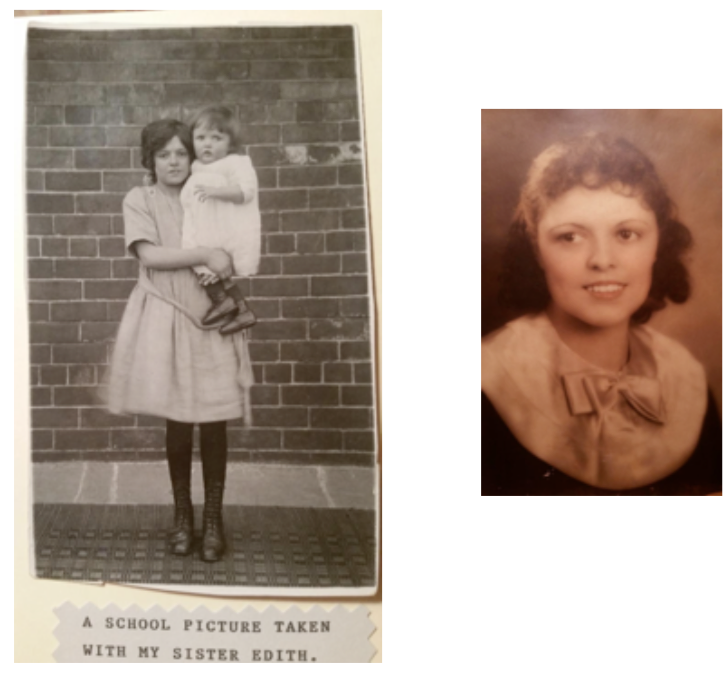
Harold (Nov. 1913)- Two kings of England were called Harold – Harold Harefoot (he was fast) son of King Cnut (can-noot). And King Harold Godwinson who was the last Anglo-Saxon King of England who took on William the Conquerer in the Battle of Hasting in 1066. Now Harold had just “wumped” the Viking King Harold Hardrata (Yeah, there were Viking Harolds too) and had given that Vikings six feet of England to bury him in. When he met William of Normandy Harold’s army was battle weary and Billy the Conquerer’s cavalry had stirrups, a brand new invention that increase their ability to stay on their horses. So King Harold lost and we ended up with Henry the II, Richard the Lion Hearted and Prince John.
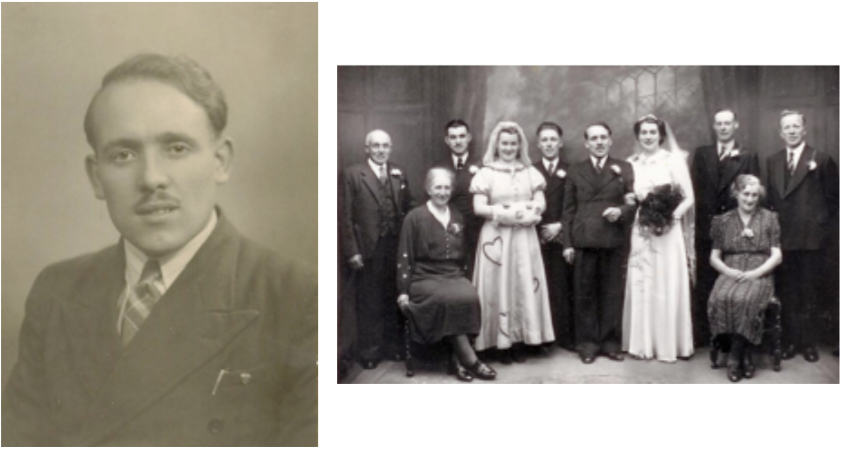
Harold, I think his Mission Picture and his Wedding to Aunt Effy
 See the Stirrups
See the Stirrups
Wilfred (1916)- A Catholic Monk and Bishop who helped establish Roman Christianity over the Celtic Christianity established by Saint Patrick in 664 AD.
 Saint or Bishop Wilfrid or Wilfred
Saint or Bishop Wilfrid or Wilfred
Ivin (June 1919 to May 1920, the other baby that died)- Might be connected to Saint Ivan a saintly monk in Bohemia. He had visions of John the Baptist and a doe (deer) who would willingly come and provide him with her breast milk. Hey, it could happen.
Edith( 1921) – Saint Edith was the illegitimate daughter of a beautiful nun who had been kidnapped by King Edger the peaceful. For penance for the rape and kidnapping of a nun the King couldn’t wear his crown for seven years (Boy that will teach ya). Edith’s mom got away and went back to the nunnery where Edith was raised and quickly became a nun herself, but had a reputation for dressing very well. After she died she appeared to her nun mother and told her she had smack the devil on his head and broke it. Thirteen years after her death another dream inspired them to exhume her body and its “fragrant perfumes gave off the breath of paradise.” There you go…..
Norma (1925) – Best reference to this name is a Druid Priestess in an Italian opera by Bellini called Norma. The heroine of the story is a real pistol.

Aunt Norma
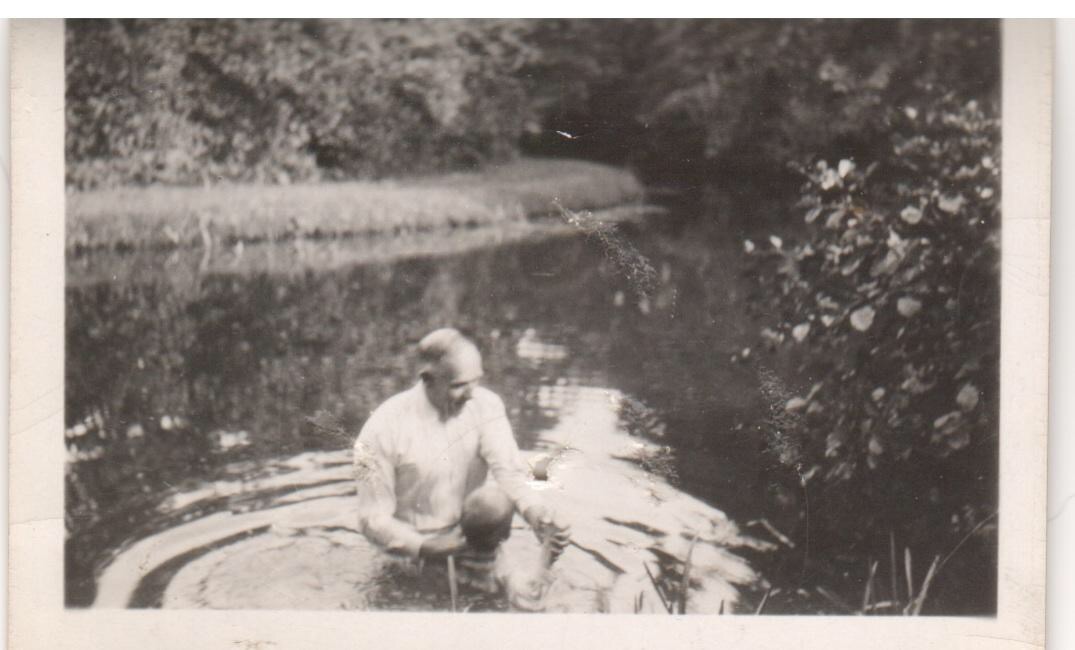
Aunt Norma’s Baptism
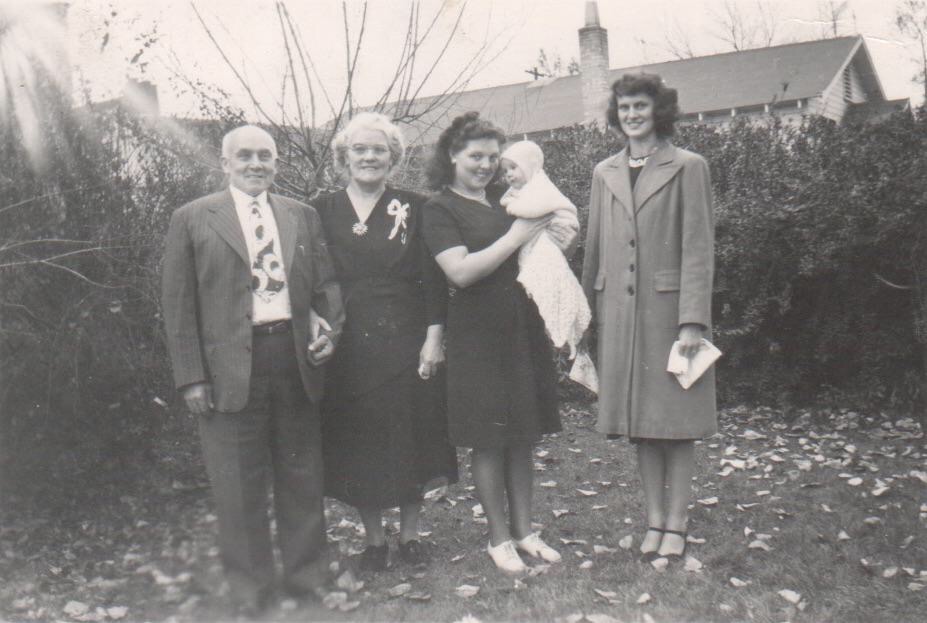
Grandpa and Grandma and Aunt Norma on I think Cousin Tommy’s Blessing day.
 Aunts Gladys, Norma and Edith – All Lovely and Kind Ladies – The best of Aunts. I adored them all
Aunts Gladys, Norma and Edith – All Lovely and Kind Ladies – The best of Aunts. I adored them all
Now I suspect, that Grandpa Thomas’s sweetest years were his years as a Branch and then a District President in Pontypool and South Wales, but something happened during this time and again it involved horses.
 I Wonder if these guys knew Grandpa Richard Who Loved Horses. Notice how they are protecting the horses eyes from the Coal Dust.
I Wonder if these guys knew Grandpa Richard Who Loved Horses. Notice how they are protecting the horses eyes from the Coal Dust.
The mines owners didn’t love the horses like Grandpa did and unlike the miners the horses didn’t have a union. But Richard who loved horses had influence and he got the Union to walk out about the cruelty to the horses. He would pay for this. Grandpa Thomas, my Dad, told me, was “Blackballed” and lost his job. He couldn’t get a job for seven years. That might have been why both his boys had to work. For their wages and so they could keep their home.
Great Grandpa Thomas didn’t waste his “Off time” he threw himself into his Church work. My Dad told me that Grandpa, when he was District President (Kinda like a Stake President. but over Branches instead of Wards) would get on his bike and cycle all over South Wales visiting the Saints and tending to his responsibilities.
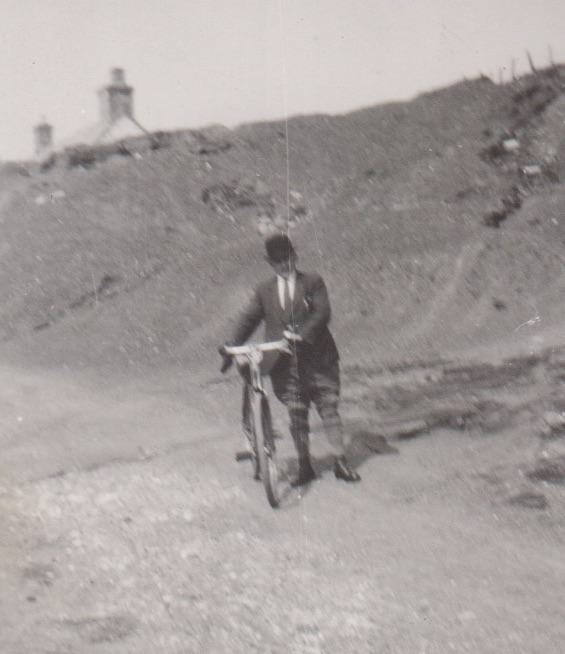
Grandpa with bike ready to attend to his flock
He was highly respected for his efforts and he noted that through his works he got to know personally many of the Leaders of the Church when they visited South Wales. He named – Charles W. Penrose, Rodger Clawson, Orson F. Whitney, David O. McKay, Joseph Cannon, James E. Talmage, Hyrum Smith, Richard R. Lyman, George Albert Smith, John A. Widstoe, Ezra Taft Benson, Joseph F. Merrill, George F. Richards and Son (that would be Legrand Richards), Richard L. Evans, Hugh B. Brown and Alma Sonne. Wow! Three Prophets of the Church and a bunch of Apostles – your Great, Great, Great Grandpa hung out with a great crowd of people.
Grandpa Thomas (My Grandpa) served as Branch President of the Pontypool Branch from 1915 to 1939 (24 years) and District President from 1939 to 1945 (Six years). But these were years with some heartache. The mine owners singled him out for abuse. My Dad told me about one time when they went to one of the Slag Heaps which is substandard coal that was just thrown away and piled in heaps, but it would burn like coal if your fire got hot enough.
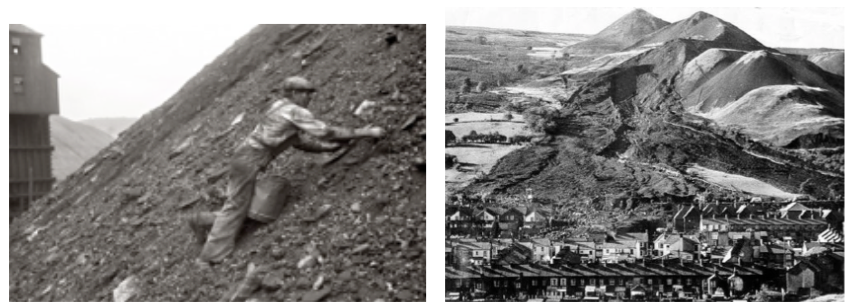
So to save money the less wealthy would climb up the slag and would pick out the lumps that would burn. Dad and grandpa were doing this when the mine owner had Grandpa arrested for stealing. Grandpa was taken by the Bobby to a judge where after an embarrassing moments they let him go, but it must have been very disturbing because my Dad remembered it vividly.
Well in October of 1945 Grandpa Thomas came from Wales (He might have already been there) to Handsworth Birmingham to give Richard (his name sake) a name and a blessing and he moved to Birmingham and became a Counselor in the Handsworth Branch. and in 1947 he joined the rest of his family in America.
Some forty years after they first married they were sealed forever in the Salt Lake Temple on September the 28, 1949.
I can remember visiting Grandpa and Grandma in their apartment in Provo. It was very small and Great Grandma Forward lived with them. It seemed very close and confined and we “youngins” were grateful to go outside and play on the porch or in the very tiny yard, but we were bored quickly. At three in the morning grandpa would hop on his bike and cycle several blocks to light the furnace at BYU where he work as a custodian. Grandma Forward would die on the 2nd of November 1954 and was buried in Salt Lake. Her husband William had died 21 years earlier in 1933 and was buried in Varteg, Monmouthshire. Four years later Grandpa would die on the 19th January 1958. Grandma too, would be a widow like her mother for 20 years dying herself on 14th of November 1978. Grandma was about 93 years old when she died. She was a large memory of my youth.
 Grandma Forward with 5 of her daughters. That a cluster of cousins to the right – I think that is Ann and Prydwyn with their backs to us probably watching the boy cousins tease some cats.
Grandma Forward with 5 of her daughters. That a cluster of cousins to the right – I think that is Ann and Prydwyn with their backs to us probably watching the boy cousins tease some cats.
I realize now that the depth of living and sacrifice that my grandparents on both sides invested in the church would in turn instill a commitment in both my mom and dad to the gospel that would call them and many of their kin to America. I couldn’t be grateful enough.
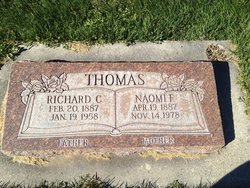 The Tomestone of two of Heavenly Father’s noble and great ones.
The Tomestone of two of Heavenly Father’s noble and great ones.
While on my mission 1962 – 1964 I got to meet many of my kin that remained behind and kept the Church alive in Pontypool and also realize what might have been my destiny, a life in the mine.
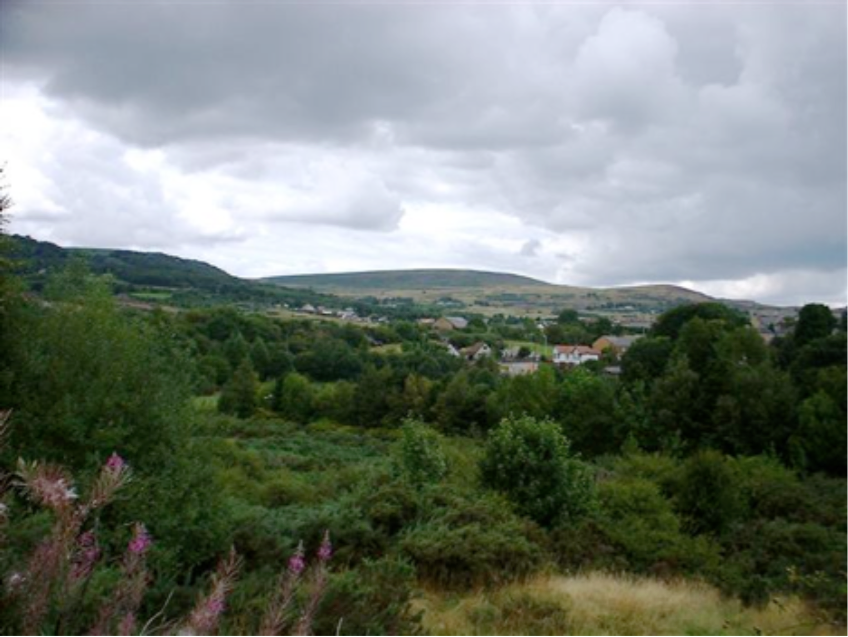 This is how I remember Wales today – how it looked and felt in 1964.
This is how I remember Wales today – how it looked and felt in 1964.
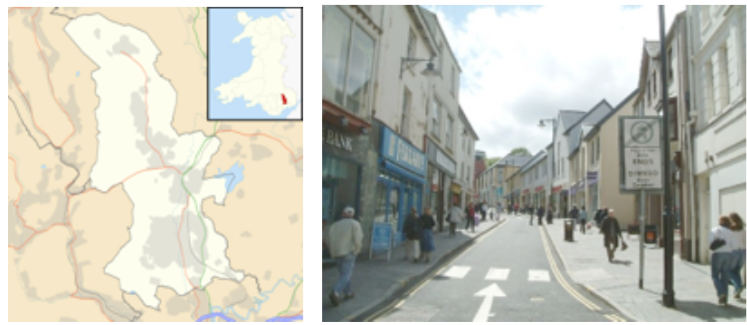
Pontypool
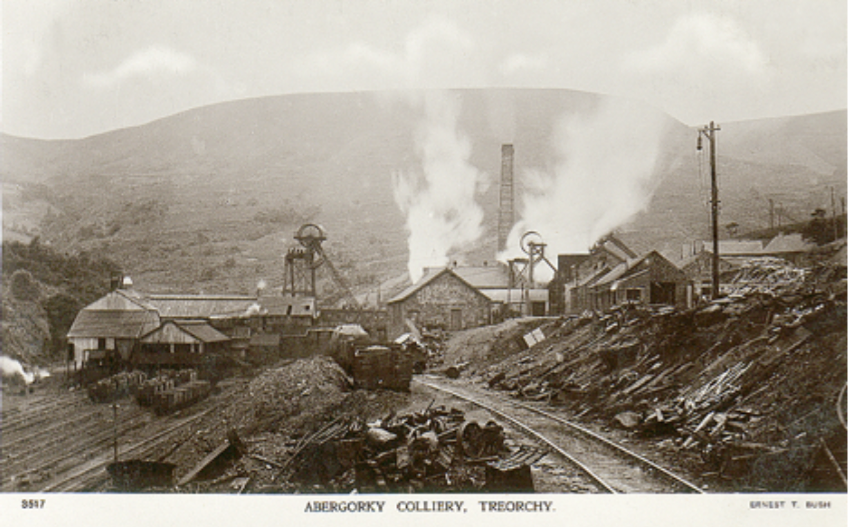 The Mines in Grandpa Thomas’s Day
The Mines in Grandpa Thomas’s Day
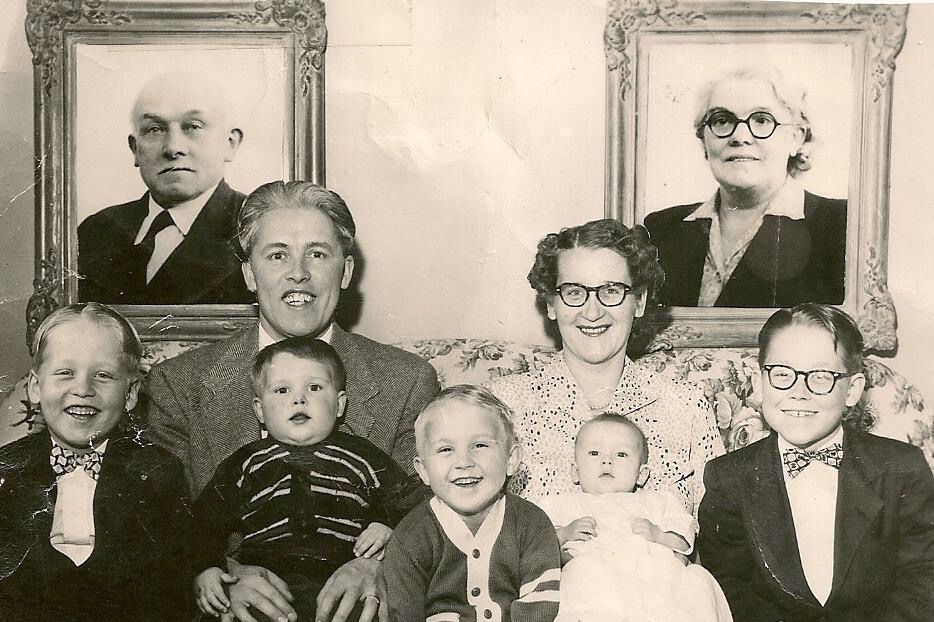
Just one growing unit of Thomas – the four kids are Richard, Karl, Chris, Harold and Me – Mom and Dad next with Grandma and Grandpa Framed.

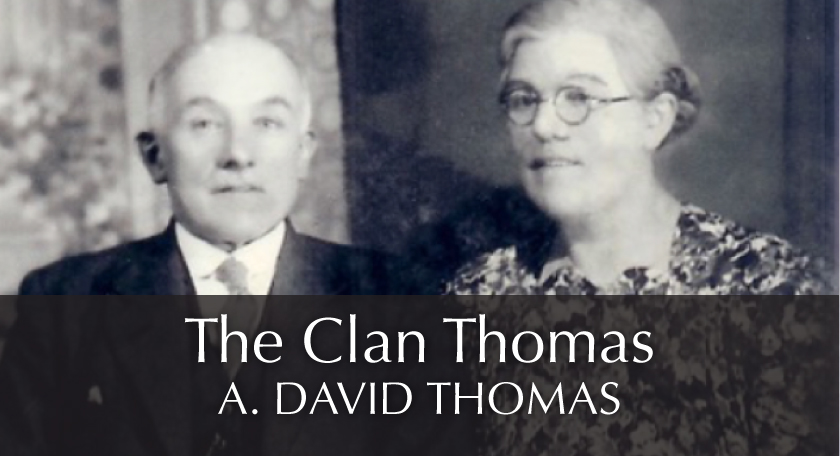
My great grandfather, William Thomas, b. 1824, was a miner in Aberdare. His wife’s name was Mary from the Joshua Phillips family. His children were Thomas, David, Jotham, Mary, William, Phoebe, and Jane. His father was Theophilus Thomas. If you have any information, kindly let me know. Thank you. David Irving, mother Adeline Thomas, USA. davidgirving@gmail.comD